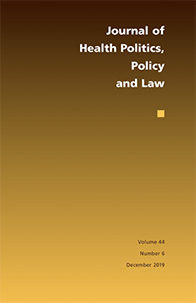Article, Refereed Journal
Journal of Health Politics, Policy and Law

Context: States face increasing Medicaid expenditures largely as a result of growing dual-eligible populations. In this article we examine self-reported community-based Medicaid participation among Medicare recipients 65 and older in California and Texas, with a particular focus on the older Mexican-origin population.
Methods: We use six waves of the Hispanic Established Populations for the Epidemiologic Study of the Elderly (H-EPESE) covering the period from 1993–94 to 2010–11.
Findings: The data reveal relatively high Medicaid participation rates by older individuals of Mexican origin, but significant differences between the two states. At baseline, 30% of older Mexican-origin Medicare beneficiaries in California reported receiving Medicaid compared to 41% in Texas.
Conclusions: Despite California's more liberal eligibility criteria, community-dwelling Texans were more likely than Californians to report coverage at some point during the 17-year follow-up. Our data, as well as administrative data, reveal that California classifies nearly all of its community-dwelling Medicaid recipients as "full duals," meaning that they receive full benefits, whereas Texas is more likely to classify similarly poor and disabled individuals as "partial duals," meaning that they receive less coverage, thereby lowering overall program expenditures. Cost containment strategies that restrict access may be especially consequential for vulnerable Hispanic populations.

